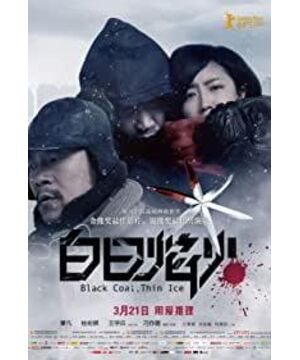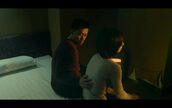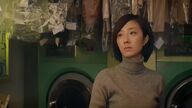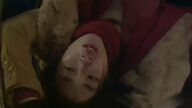[About the name and image]
I think the name and image of "Daylight Fireworks" definitely have meaning, but they don't have such a big and decisive meaning. Probably only people who have not done any independent artistic creation in their entire life except propositional composition, will the names and contents of all works of art must be associated with a meaning. In fact, when an artist names his own work, it may involve the core theme, or it may be to find a bright spot in the secondary elements, or it may be really impossible to think of a nonsense, and it may even be for the purpose of pretending to be coercive or cute-the reason is too great too much. The director said that the fireworks imagery is completely outside the story, and I thought it was good when I saw it by chance, so I leaned the story on it. The English name of the daytime fireworks is "Black Coal Thin Ice". What if the Chinese and English names were changed? That's another explanation.
From Wu Zhizhen's point of view, "Fireworks in the White Sun" is the name of the nightclub, and it also represents the owner of the leather cloak who coerced and raped her. The moment she went to the nightclub to find the boss, her fate was doomed. The fireworks in the daytime are the heavy boundary monument of her fate, and the fireworks that Zhang Zili finally set off are probably a heavy tribute to Wu who is about to be imprisoned.
So what about Zhang Zili?
What are the daytime fireworks like? invisible. And who would set off fireworks in broad daylight? I did this once when I was a kid, and I've seen others do it a few times. That kind of mood is that I can't wait, knowing that there is no effect during the day, but I still can't help but want to let it go; but after letting it go, it really has no effect, and my heart is empty again, and there is regret and distress for wasting fireworks. As for an adult like Zhang Zili, it's probably not a childlike playfulness and curiosity that can't wait, but has accumulated too many emotions and desires, and can't wait to vent and release it. In fact, the effect is invisible. Not even "gorgeous". Zhang Zili is the winning party in the power relationship with Wu Zhizhen (although Wu tried to use Zhang to get rid of Liang but failed), regardless of career or lust, but what did he win? But it's a little slower to lose.
Man is a futile passion, oscillating between the satisfaction of desire and the pain of want.
[About Harbin]
According to the director, I originally wanted to find a city in the north and settled on Fushun. Later, the scene selection failed and I changed it to Harbin. The director also said that they are all for the story. There is no need to shoot the Northwest, so I will bring a bit of Qin Opera, and if I shoot the Northeast, I will shoot a two-person turn.
This director is a sensible person (of course I want to protest that the two have little to do with Harbin). It is said that Harbin is in line with the story and the decadent and depressed temperament of the hero and heroine. Liao Fan said that "there are many dilapidated houses, but you can reach out and touch the carved railings". The temperament of Harbin is not only decadent, but also very trendy and cheerful, but in the depressed winter, this taste is also very accurate. I'm glad that he didn't shoot Central Street Sophia Church and Laodaowai in Harbin - of course, the Songhua River and the railway bridge appeared due to the need of the plot - but only from the same old residential buildings in the same cement box style, the road in the snowy night and the sides on both sides. A certain aspect and a certain atmosphere of the city are accurately captured in the storehouses, hot pots and skewers. Not to mention the demeanor and accent of the people I am familiar with. My heart is really warm.
They don't decorate any superfluous symbols and signs, so that foreign reporters think this is a "village"; but when I saw it, I knew it was Harbin.
It's so rare.
[About Gui Lunmei]
Following the above, it is precisely because the story is set in the "northern city" that Wu Zhizhen's role is more difficult to locate.
Of course, she can't be too abrupt, which is also the point of view of many critics of Gui Lunmei. But she can't be too vulgar - can you find a real Northeastern old lady or a little daughter-in-law to play it? (I thought about the combination of Sun Honglei + Ding Jiali...or Qin Hailu, or are there any other outstanding young actresses from Northeast China?) It doesn't seem right. Wu Zhizhen is to have a sense of mystery, alienation, and a sense of fairy. This is in line with the temperament of Gui Lunmei.
In fact, how hard did Xiaomei work? ? ?
She really experienced life in a family-style laundry in Harbin! She really has a Harbin accent! ! If you don't believe me, listen to the most lines of her lines. The police asked her to explain, and she reported a lot of home address and personal hobbies. Among them, the "7" of "I live at No. 7 XX Street" is the second sound, and the whole The tone of the sentence is also the taste of Harbin. But it's still not enough practice.
The only problem with small magnesium is: too! nice! ! When she turned around for the first time, you couldn't understand how a young and fresh Taiwanese girl was parachuted into the white mountains and black waters! A low-class working woman, a young daughter-in-law of a laundry shop, should not be like this! The director should have made her makeup rougher in the previous paragraphs, so that she and Zhang Zili will be radiant after getting better, and there will be a strong contrast.
Another point that is not in line with the reality of life is that in that kind of old-fashioned residential building, on the first floor, there is also a store and a laundry shop where people come and go. The matching of the shirt is perfect! right! Carry! Do not! live! of! And it's not always working in the ironing shop. Alas, but in order to outline the figure to seduce the male protagonist, so be it.
Go back and read it again, and write again when you think about it later.
View more about Black Coal, Thin Ice reviews











